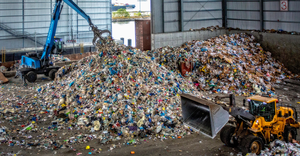LANDFILL: Old Landfill Suits County Needs to a Tee
August 1, 2001
Kim A. O'Connell
For years, Atlanta's Fulton County has struggled to deal with the defunct Morgan Falls Landfill, which costs the county more than $200,000 in annual maintenance fees. Since closing in 1988, the 145-acre site located in the upscale Sandy Springs community also has been used for a garbage transfer station, recycling center and composting facility.
In recent years, the composting site has caught fire, methane has leaked from the landfill and an underground gasoline pipeline has burst. The community long has considered the landfill an environmentally dangerous and smelly nuisance.
Then five years ago, golf course developer Kay Broaddus, president of Atlanta-based Eagle Golf Ventures, saw green in her Sandy Springs backyard. Frustrated with the long drive from her home to a public golf course, and knowing that old landfills have become new golf courses, Broaddus thought it was time Atlanta had one, too.
“[Atlanta] needed more public golf courses. The issue was how to make it a good business because golf courses need a lot of land, on the magnitude of a 100 acres,” Broaddus says. The land has to be reasonably priced and located near population centers, she adds.
In Atlanta, the country's second fastest growing city, open land is hard to come by as new office buildings and roads sprout up. But the Morgan Falls landfill fits the golf course bill.
There are many benefits to turning landfills into golf courses, according to www.brownfieldgolf.com, which is owned by Tampa, Fla.-based Fairway Interests Inc. For landfill owners or municipalities, this type of development rejuvenates once defunct space, while potentially reducing the costs of post-closure care and maintenance. For developers, these sites often can be bought for a low price, usually are located in large metro areas, can secure permitting easily because of Brownfields initiatives and the transformation is community supported. The community benefits from new jobs, higher property values and a nearby recreational facility.
When Broaddus approached Fulton County, she found enthusiastic support. After properly capping the landfill and installing a methane extraction system, the county agreed to lease the land to Broaddus, who is spending approximately $4 million to develop the site. Now more than halfway completed, the course is expected to open in Nov. 2001.
To begin the project, Broaddus built a pilot practice center on a closed cell that included every aspect of a golf course — tees, sand traps and putting greens. Although the pilot was successful, the landfill still posed several challenges.
The chief obstacle was that like many landfills, Morgan Falls was flat. The best golf courses have undulating hills, valleys and bunkers that are both scenic and challenging for golfers. To create mounds on the course, Broaddus needed fill for the site because cutting into the landfill could damage its cap. So, she arranged for more than 50,000 dump truck loads of dirt to be brought from a nearby rail line construction site and for soil to be mixed with leftover compost.
“I [cultivated] good relationships with developers, and every time I saw construction [sites], I [told them] that if they had good excess fill — not sludge — [they could] bring it to the site,” she says. “I ultimately had developers coming to me.”
Broaddus and her architect, Michael Riley, faced a host of other challenges, as well. There are masses of power lines strung overhead, a stormwater detention pond and an underground pipeline.
Currently, the pond is situated over the pipeline, dangerously weighing it down. Broaddus and the county are working on a plan to move the pond and use it for the course's irrigation system. In many ways, Broaddus explains, “the needs of a golf course and a landfill are the same.”
Riley also had to work around the gas extraction system, whose vents eventually were painted to blend in with the surroundings.
Broaddus adds that county support has been paramount to the project's success. Bob Fulton, the aptly named district commissioner for North Fulton County and an engineer, has been a strong supporter of the project from the beginning. He is credited with helping Broaddus navigate through the bureaucracy a public-private partnership can produce.
In addition, Fulton has encouraged other environmentally sound development in the landfill area, which borders the Chattahoochee River. For example, a proposed jogging path will connect an adjacent ball field with the golf course and lead down to the waterfront.
“This has been a dream for Kay and me,” Fulton says. “We have turned a trash pile into a jewel. This will eliminate the costs and maintenance, and the blight of an old landfill.”
Fulton encourages other municipalities and developers to consider similar partnerships. But he warns them to be prepared for unexpected challenges.
“It will require a champion inside the government with authority, a private sector champion who is willing to risk [his or her] money and people who will not give up,” Fulton says. “This is a good example of what you can do with a landfill if you work hard at it and you've got determination, patience and faith.”
To read additional articles about landfills, visit www.wasteage.com
You May Also Like


